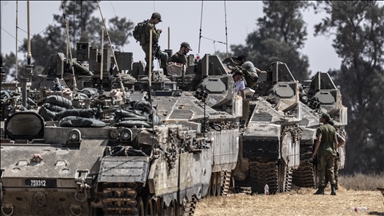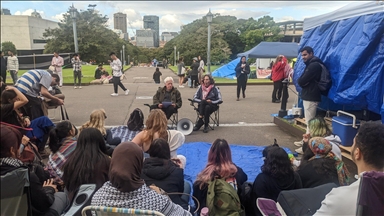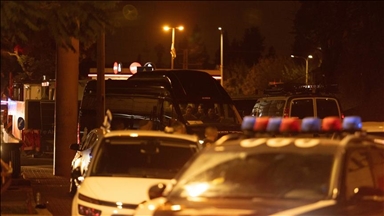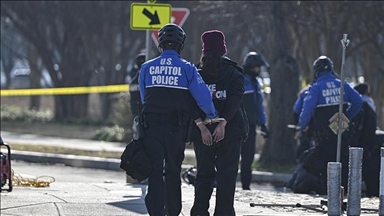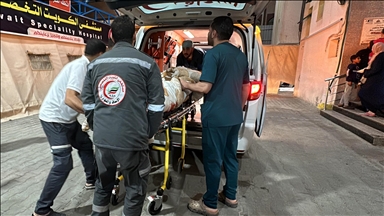Israeli far-right ministers criticize committee investigating Oct. 7 attacks
Formed by Army Chief of Staff Herzi Halevi, probe committee is headed by former Defense Minister Shaul Mofaz
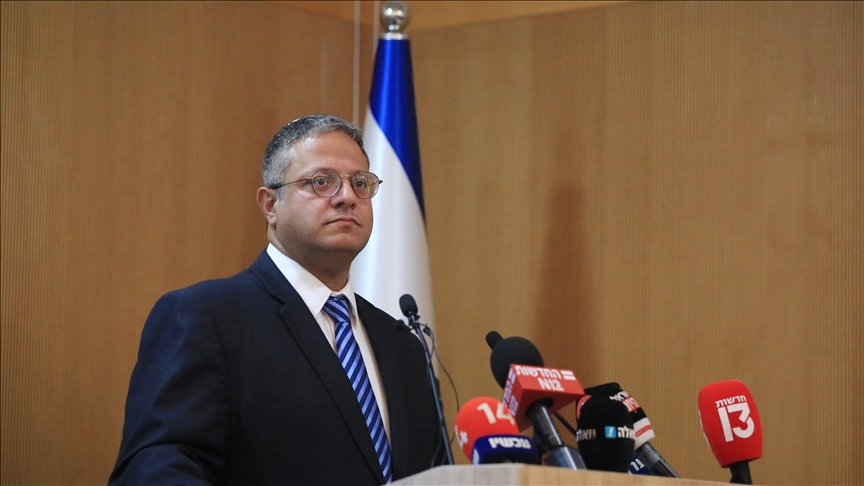 Israeli National Security Minister Itamar Ben-Gvir ( Saeed Qaq - Anadolu Agency )
Israeli National Security Minister Itamar Ben-Gvir ( Saeed Qaq - Anadolu Agency )
JERUSALEM
Israeli National Security Minister Itamar Ben Gvir and Finance Minister Bezalel Smotrich on Friday criticized a committee formed by Army Chief of Staff Herzi Halevi to investigate the Oct. 7, 2023, attacks by Hamas.
The Israeli Public Broadcasting Corporation said earlier Friday that the investigation committee formed by Halevi and headed by former Defense Minister and former Chief of General Staff Shaul Mofaz, also includes Reserve Maj. Gen. Yoav Har-Even and Reserve Maj. Gen. Aharon Ze'evi-Farkash.
On Thursday evening, a disagreement broke out at the Israeli Ministerial Council for Security and Political Affairs meeting between a number of ministers and Halevi, over several matters, including members of the committee probing the Oct. 7 events, the corporation said.
“The appointment of Mofaz, one of the main architects of the promiscuous secession (2005 Israeli withdrawal from Gaza), a political figure, and above all an essential partner in the conception that brought us to this point, to the investigation team for the events of 7/10, is in the sense of a crime,” Ben Gvir, leader of the far-right Otzma Yehudit party, said in a statement on X.
Ben Gvir opposed the Israeli withdrawal from Gaza in 2005 and considered it the main reason for the Oct. 7 attack.
“The investigation should also include the issue of the historical mistake of the deportation, and certainly not appoint its architects to examine the failure that is a result of their actions,” he added.
Ben Gvir also noted that “the same goes for Ze'evi-Farkash (former head of the Military Intelligence Division).”
“These are people whose actions need to be investigated. These should not be the investigators,” Ben Gvir added.
In August 2005, Israel evacuated four settlements in the northern West Bank, in addition to Gush Katif in southern Gaza, as part of the unilateral Israeli disengagement plan, which was taken during the era of former Prime Minister Ariel Sharon.
Finance minister and head of the far-right Religious Zionism party, Bezalel Smotrich, said that the Cabinet meeting “discussion did not explode.”
In a statement, Smotrich said that “indeed, in the last five minutes there was a stormy discussion on the issue of the investigative team, but the high tones were between the ministers and not in front of the Chief of Staff.”
He noted that Mofaz is a “political figure” and Farkash “supported protests against controversial judicial reform laws” before the war.
“My position: Operative investigations designed to draw lessons relevant to the continuation of the war must be done during the war, all the rest after the war. As far as I understand, this is also the position of the Chief of Staff,” the minister said.
“Regarding the composition: it was possible to find more suitable and less political people, mainly to maintain the neutrality of the Israel Defense Forces and trust in it,” he added.
“Questions and criticism from a political level to the commanders of the Israel Defense Forces are not exaggeration,” Smotrich said, noting that “It is permissible and even desirable to ask the army questions and also to criticize it.”
Netanyahu's government is being subjected to a campaign of widespread criticism in Israeli circles due to its failure to predict in advance the attack launched by Palestinian fighters on the settlements surrounding the Gaza Strip on Oct. 7.
Israel has launched relentless air and ground attacks on the Gaza Strip since a cross-border attack by the Palestinian resistance group Hamas on Oct. 7.
At least 22,600 Palestinians have since been killed and 57,910 others injured, according to Gaza’s health authorities, while nearly 1,200 Israelis are believed to have been killed in the Hamas attack.
The onslaught has left Gaza in ruins, with 60% of the enclave's infrastructure damaged or destroyed and nearly 2 million residents displaced amid acute shortages of food, clean water and medicine.
*Writing by Ikram Kouachi in Ankara
Anadolu Agency website contains only a portion of the news stories offered to subscribers in the AA News Broadcasting System (HAS), and in summarized form. Please contact us for subscription options.


